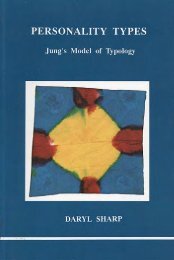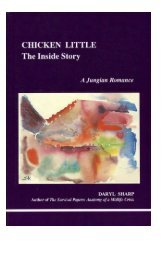Digesting Jung: Food for the Journey - Inner City Books
Digesting Jung: Food for the Journey - Inner City Books
Digesting Jung: Food for the Journey - Inner City Books
You also want an ePaper? Increase the reach of your titles
YUMPU automatically turns print PDFs into web optimized ePapers that Google loves.
90 Self-Knowledge and Statistics<br />
. . . The distinctive thing about real facts, however, is <strong>the</strong>ir individuality.<br />
Not to put too fine a point on it, one could say that <strong>the</strong> real<br />
picture consists of nothing but exceptions to <strong>the</strong> rule . . . .<br />
These considerations must be borne in mind whenever <strong>the</strong>re is<br />
talk of a <strong>the</strong>ory serving as a guide to self-knowledge. There is and<br />
can be no self-knowledge based on <strong>the</strong>oretical assumptions, <strong>for</strong> <strong>the</strong><br />
object of this knowledge is . . . a relative exception and an irregular<br />
phenomenon. 81<br />
Similarly, in <strong>the</strong> treatment of psychic suffering, <strong>Jung</strong> stressed<br />
that <strong>the</strong> scientific knowledge of humankind in general must take<br />
second place; <strong>the</strong> important thing is <strong>the</strong> particular person. On <strong>the</strong><br />
one hand <strong>the</strong> analyst is equipped with statistical truths, and on <strong>the</strong><br />
o<strong>the</strong>r is faced with someone who requires individual understanding.<br />
One need not deny <strong>the</strong> validity of statistics, but <strong>the</strong> more schematic<br />
<strong>the</strong> treatment, <strong>the</strong> more resistances it calls up in <strong>the</strong> patient. The<br />
analyst <strong>the</strong>re<strong>for</strong>e needs to have a kind of two-way thinking: doing<br />
one thing while not losing sight of <strong>the</strong> o<strong>the</strong>r.<br />
The recognition that <strong>the</strong>re is an unconscious side of ourselves<br />
has fundamentally altered <strong>the</strong> pursuit of self-knowledge. It is apparent<br />
now that we are twofold beings: we have a conscious side we<br />
more or less know, and an unconscious side of which we know little<br />
but which is generally no secret to o<strong>the</strong>rs. When we lack knowledge<br />
of our o<strong>the</strong>r side, we can do <strong>the</strong> most terrible things without<br />
calling ourselves to account and without ever suspecting what<br />
we’re doing. Thus we may be baffled by how o<strong>the</strong>rs react to us.<br />
The increased self-knowledge that comes about through depth psychology<br />
allows us both to remedy our mistakes and to become more<br />
understanding and tolerant of o<strong>the</strong>rs.<br />
Self-knowledge can have a healing effect on ourselves and our<br />
environment, but this seldom happens without a prolonged period<br />
of professional analysis. Self-analysis works to <strong>the</strong> extent that we<br />
are alert to <strong>the</strong> effects of our behavior and willing to learn from<br />
<strong>the</strong>m; however, it is limited by our blind-spots—our complexes—<br />
81 Ibid., pars. 493ff.










